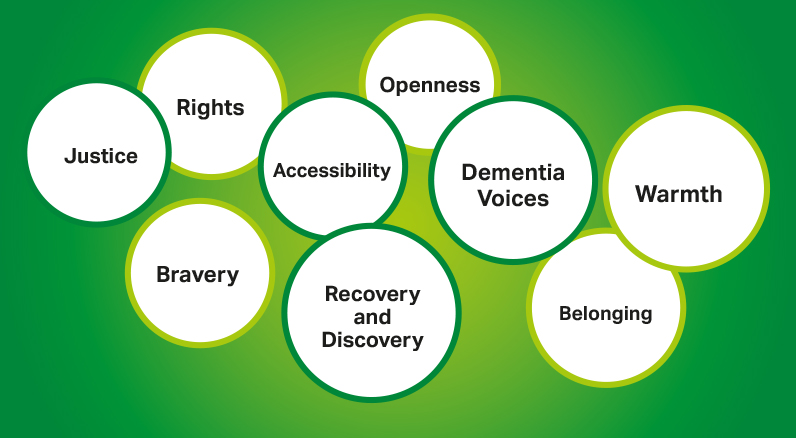I’ve just been reading some excellent material by Swarbrick et al (1) and Morbey et al (2). It covers work that has been going on to ensure meaningful involvement and inclusion of people with dementia as co-researchers rather than as subjects of research. There is a powerful recognition of the need for a move away from ‘researching on’ to ‘researching with’.
This has been recognised too through an award from the National Lottery Community Fund for the Innovations in Dementia project, Dementia Enquirers – where people with dementia within DEEP (the UK network of Dementia Voices) shall be equipped to develop their own research questions; lead on their own research ideas; and create their own research methods.
It sounds ambitious and it is. Scary too! The language of academia has evolved and developed over centuries – not, as some critics may believe, to bamboozle the uninitiated and to maintain a magic, a mystique and an air of superiority and uber intelligence over the rest of us mere mortals – but rather as a short hand. It may be hard to believe to a lay person like me, but a lot of those long words are in fact a short hand – a language of convenience amongst academics – actually to be succinct!
There is a growing movement of people with dementia with a new (or a louder) voice that is now seeking, rightly, to take ownership of research under the ‘nothing about us without us’ rallying call. Indeed, as my friend Paul, a member of York Minds and Voices, said several years ago now, ‘If you’re doing research about dementia and you don’t include people with dementia, then you’re wasting your bloody time’.
But it’s not that simple. Entering this world, deciphering studies and literature already created in essentially another language, with a limited capacity to learn this new language, is not going to be easy.
I speak ‘pidgin academ-ese’. Certainly not fluent, but good enough to get a point across, ask a question and try to plan something or test out something. But I’m still bamboozled by a lot of academic reports I come across (just look at the title of the two articles I have referenced at the start of this piece!). I skim quickly to the executive summary or the conclusions section in the hope there is a simple message or finding that I can cling to.
But from the point of view of the academics, one can imagine the reaction to a bunch of potential upstarts entering their domain and expecting to be understood. Akin to a lobster-coloured Brit on holiday in the Costa Brava landing at the bar, shouting ‘dos bieres por favour, garcon!’
One can understand a trepidation at no longer being amongst those peers who ‘get’ their shorthand created over centuries; that they might be slowed down by the pain of having to accommodate a new cohort in their midst. But accommodate they must!
My kids tell me Latin is dead and look to the heavens when I state the contrary, but I must point out that ‘accommodate’ is indeed from the Latin ‘to make comfortable’. So, making comfortable is NOT a pain at all and that goes for both sides.
The inclusion of people with dementia in research is not about usurping power or knowledge, it’s about collaboration (from the Latin, ‘working together’!). No-one expects someone to enter a new culture and to speak the language fluently, nor should that language or culture be disabling. But we can find a comfortable space.
I got thinking about an equivalent ‘comfortable space’ I came across years ago, as a young nurse in learning disabilities. People with communication difficulties were not excluded nor expected to be fluent, but the brilliant and simple MAKATON language system (3) helped create many positive connections. This method involved the use of signing only key words in a sentence to facilitate communication.
So, we must ask ourselves, what is the MAKATON equivalent for people with dementia to engage, to ask a question, to test a question, to explore ways of measuring and carrying out those tests and questions? The Dementia Enquirers project will no doubt go a long way to contributing to a necessary and an inevitable change in the language around research.
We should all look forward to more comfortable times…
By Damian Murphy, Director, Innovations in Dementia.
(1) Swarbrick et al (2016) Co-producing a model of involvement and engagement in research (Innovative Practice) Dementia 0 (0) 1-8
(2) Morbey et al (2019) Involving people living with dementia in research: an accessible modified Delphi survey for core outcome set development.
https://doi.org/10.1186/s13063-018-3069-6 accessed 12/02/2019
(3) Makaton: https://www.makaton.org/aboutMakaton/ accessed 12/02/2019


I’ve heard of Talking Mats being used to successfully be inclusive people with greater support needs with communication in research.
Definitely an option, Mark, thanks
A really good, well-argued piece – which I’m sure you know!
From a broader equalitiy & diversity viewpoint I think that this reasoned “mutual listening” approach is good and beneficial – nothing wrong with “to the barricades!” when needed, but I do believe that discussion and co-operation is a better use of time and energy for all of us. And hopefully more productive!
Thanks Adrian. It was just a thought on a train the other day but very much reflects where we are at particularly with the new dementia enquirers project – but generally with the need to ensure everyone can properly contribute to such processes, however limited that might be. thanks for your tweets too! Damian